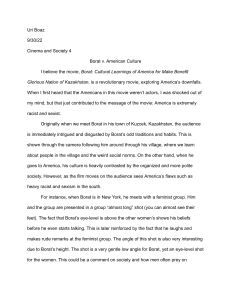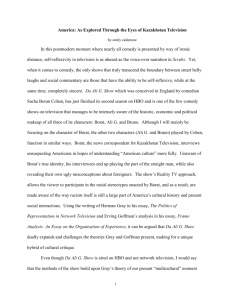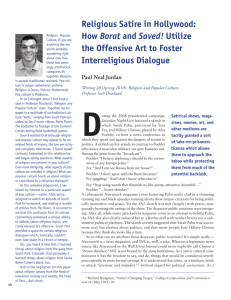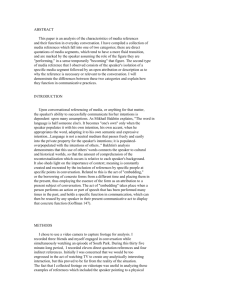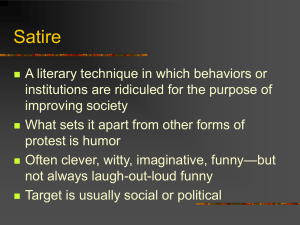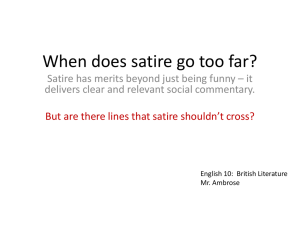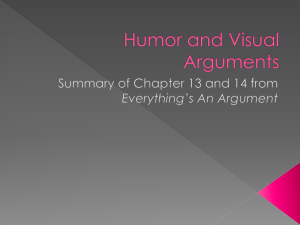Document 11194984
advertisement
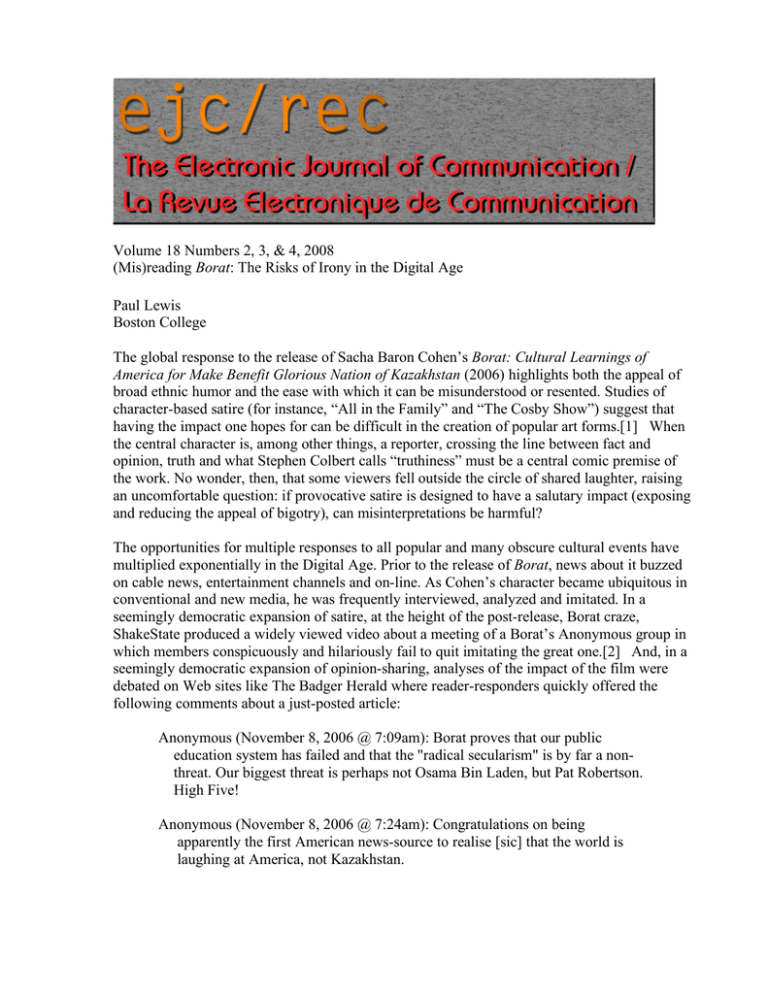
Volume 18 Numbers 2, 3, & 4, 2008 (Mis)reading Borat: The Risks of Irony in the Digital Age Paul Lewis Boston College The global response to the release of Sacha Baron Cohen’s Borat: Cultural Learnings of America for Make Benefit Glorious Nation of Kazakhstan (2006) highlights both the appeal of broad ethnic humor and the ease with which it can be misunderstood or resented. Studies of character-based satire (for instance, “All in the Family” and “The Cosby Show”) suggest that having the impact one hopes for can be difficult in the creation of popular art forms.[1] When the central character is, among other things, a reporter, crossing the line between fact and opinion, truth and what Stephen Colbert calls “truthiness” must be a central comic premise of the work. No wonder, then, that some viewers fell outside the circle of shared laughter, raising an uncomfortable question: if provocative satire is designed to have a salutary impact (exposing and reducing the appeal of bigotry), can misinterpretations be harmful? The opportunities for multiple responses to all popular and many obscure cultural events have multiplied exponentially in the Digital Age. Prior to the release of Borat, news about it buzzed on cable news, entertainment channels and on-line. As Cohen’s character became ubiquitous in conventional and new media, he was frequently interviewed, analyzed and imitated. In a seemingly democratic expansion of satire, at the height of the post-release, Borat craze, ShakeState produced a widely viewed video about a meeting of a Borat’s Anonymous group in which members conspicuously and hilariously fail to quit imitating the great one.[2] And, in a seemingly democratic expansion of opinion-sharing, analyses of the impact of the film were debated on Web sites like The Badger Herald where reader-responders quickly offered the following comments about a just-posted article: Anonymous (November 8, 2006 @ 7:09am): Borat proves that our public education system has failed and that the "radical secularism" is by far a nonthreat. Our biggest threat is perhaps not Osama Bin Laden, but Pat Robertson. High Five! Anonymous (November 8, 2006 @ 7:24am): Congratulations on being apparently the first American news-source to realise [sic] that the world is laughing at America, not Kazakhstan. Anonymous (November 8, 2006 @ 9:26am): Well I thought the movie sucked.[3] My book, Cracking Up: American Humor in a Time of Conflict (2006), which came out weeks before Borat was released in the United States, proceeds from the view that, while most humor is beneficial or benign, some jokes and other comic expressions do real harm by inflicting pain, promoting bias, encouraging us to relax about problems we need to address seriously, and persuading us fallaciously by way of what can be called argumentum ad mirth.[4] So I take some pleasure here in bucking my own tendency and arguing not that Borat is harmless but that any harm the film may have done is far outweighed by the value of the points it makes through ridicule and satire. Of course, not everyone agrees with this. Sacha Baron Cohen has been assailed and sued for cheating, slandering, defrauding, and deceiving the targets of his mockery—including the entire nation of Kazakhstan and several of the people who appear to disadvantage in the movie. Prior to the release, the Kazakh Foreign Ministry declared that Borat “does not represent the true people of Kazakhstan," and took out a 4-page ad in the New York Times and International Herald Tribune called "Kazakhstan in the 21st Century" that touted the former Soviet republic’s oil production, democratic government, educational system, and liberated women. The latter point must have seemed especially urgent, given Borat’s insistence on the oppression of women in his fictional country as seen in the celebration of prostitution in national rankings, subjugation of wives, and incestuous relations between siblings. After the Kazakh government threatened to sue Cohen, the Borat Web site carried the following response: "I like to state I have no connection with Mr. Cohen and fully support my government's decision to sue this Jew”—at which point the Kazakh government backed down, suggesting finally that perhaps it was ready for the 20th, if not quite yet the 21st century, after all.[5] According to an article by Josh Grossberg that circulated on-line,[6] individuals who claimed the movie hurt them included the young businessman Borat chases through the streets of Manhattan early in the film; “two Romanian villagers, one of whom ‘played’ the town's mechanic/abortionist in Borat's opening and closing scenes”; and “an Alabama etiquette teacher named Cindy Streit [who] didn't appreciate being handed a bag supposedly containing Borat's feces during the dinner party scene.” So far, these legal challenges have failed, but that shouldn’t stop us from asking whether they have merit on a human level: how should we regard the claim that Cohen wounded people by tricking them into the expression of unappealing opinions, attitudes, and responses? Between the rodeo manager who’d like to murder gays, the gun shop clerk who helps Borat buy the best gun for hunting Jews, and the dinner party guests who were more horrified by the appearance of a black floozie than of a bag of shit at the table—the movie presents a veritable parade of bigots and creeps—none more bigoted or creepy than the three University of South Carolina students who are both literally and figuratively taken for a ride by Borat. In a few minutes, these guys call women “bitches and hos,” advocate “fucking the hell out of them and never calling them again,” and rail against minorities including Jews who “have all the power.” I’d like to consider two possible dangers in all this: Borat’s influence (1) on people who appear in the film and (2) on members of the audience who feel encouraged to express or act out (rather than suppress) their own bigotry, misogyny, racism, etc. Could either of these unintended consequences occur? My short answer: yes, but don’t blame Cohen! (1) Borat’s influence on people who appear in the film (or earlier Borat sketches on Da Ali G Show): consider two scenarios: imagine that you’re an attractive young woman who runs into the Carolina frat boys on the evening they were filmed: in retrospect, would you be safer before or after their discussion with Borat? Before or after they have laughed about subjugating women? Before you answer, consider the experiments that led to Thomas E. Ford and Mark A. Ferguson’s development of Prejudice Norm Theory.[7] They found that exposing men who regard women with hostility to sexist humor tends to reduce their inhibitions against violence aimed at women. So we should at least concede that by conjuring the inner haters in his interlocutors Borat can empower the very impulses he is mocking in them. If you doubt this, consider another example: an Hasidic Jew who looks the part is passing through the town in which Cohen is filming the “Throw the Jew Down the Well” sketch. When the Jew’s car breaks down in the dark of night, he finds himself walking across an isolated corner of the parking lot of the country western bar where the sketch takes place. If he is going to run into a group of young men from the bar, could it matter whether the encounter takes place before or after they join Borat in mirthful anti-Semitic singing? Again, the comic relaxation of taboos against acting out hostile impulses suggests that the Hasid in this example might be better off if he crossed paths with these men before their encounter with Borat that could seem to license their worst, most hateful thoughts and ideas. (There is a remedy for this: whenever possible, Cohen’s production company should debrief the people who appear in his work, making sure they understand the playful spirit and actual moral frame of the exercise.) (2) Borat’s influence on members of the audience (the broader social impact of the film): about 6 weeks after it opened and at the height of its commercial and critical success, contrarian news stories asked whether Borat was a “bad influence.” On ABCNews.com, for example, Marcus Baram discussed the complaint of 17-year old Stephanie Serano, a student at the Fashion Institute of Technology, who said "Some guys have been more disrespectful [to me]. They go around repeating that line, 'Very nice. How much?' to some of the girls. I think it's disgraceful." Although spokespersons for the Anti-Defamation League, the National Organization for Women, and the Leadership Conference on Civil Rights queried by Baram said that they were unaware “of any increase in incidents of anti-Semitism, sexual harassment or racism inspired by Borat, it’s likely that Serano was not the only woman to whose immediate discomfort Cohen contributed. Should we be concerned about this and, if so, to quote the great one: how MUCH? Of course, it’s a matter of tone: many boys who appear to be treating girls as prostitutes are in on the joke, not at all aggressive and understood by all involved to be imitating Borat just for a laugh. A boy who uses Borat to insult, degrade, and humiliate has completely misunderstood the point and purpose of the satire: he is not only a misogynist lout but also a very, very bad interpreter of satire, film, and comedy in general. The remedy is remedial instruction in critical thinking and analysis. Intrinsically neither subversive nor conservative, humor is a supple force in inter-personal communication and in the maintenance or reform of accepted ideologies. There is no doubt that ridicule can support wrongheaded, destructive ideas. But there is also no doubt that ridicule and satire can contribute to positive shifts in the way people think about ideas, acts, and other people. Clearly Cohen is all about this use of mockery. The fact that dolts can miss his point does not mean that he has failed to make it clearly—only that people stupid enough to think of women as whores and potential slaves, or of gays or Jews as appropriate targets of violence may well also be stupid enough to misread Borat. But it’s not Cohen’s fault if they have been subjected to inadequate parenting and humanities education that has left them unable both to reject prejudice and to comprehend art. Indeed, their very inability comes full circle around to proving Cohen’s point (his most alarming “cultural learning”) about the levels of hateful ideation and contempt lurking just below the veneer of American civilization. It will take more than one movie to throw all that down the well. So if the question is whether Borat can do harm, the answer is yes. BUT this can happen if and only if what he is saying is missed; that is, as an unintended consequence. Unlike physicians, satirists cannot promise to “do no harm.” Indeed, the imperfect world they seek to reform is inhabited by imperfect human beings in need of correction. If some of these imperfect ones fail to see that Borat, the character, is not only foolish but also woefully ignorant, sexist and bigoted, if they laugh with rather than at him and his disgraced interlocutors, then they demonstrate just how urgently they need what Sacha Baron Cohen provides. This is the satirist’s dilemma, which even Jonathan Swift probably dealt with from time to time, perhaps late at night as he worried that somewhere in Ireland someone who had read his essay was looking at a baby and thinking “hmmm, ‘ delicious, nourishing, and wholesome.’” .......... As this essay moves through its final pre-publication editing, the issues it considers have risen to a high state of public awareness as a result of the publication by the New Yorker magazine of a cover by Barry Blitt that depicts Barack Obama as a Muslim and Michelle Obama as a guncarrying black revolutionary.[8] The images, which were intended to mock racist caricatures, appeared during an intense season of political sparring as the Obamas were working to introduce themselves to the broad electorate. Because the stakes were high, because Obama supporters were holding their breath and crossing their fingers, the cover provoked a torrent of protest and started a national debate about the risks of irony. Insofar as a satire uses humor to affect the views of readers or viewers (that is, rhetorically), its actual (as opposed to its assumed or imagined) impact needs to be part of any assessment of its success. As far as we know, “ A Modest Proposal” did not disinhibit infant cannibalism anymore than Borat boosted misogyny. But if the 2008 presidential election is close enough for very small shifts in public opinion in even a single swing state to determine the outcome, and if enough people who see and misunderstand the Blitt cartoon have negative views of the Obamas confirmed and then decide to vote for Senator McCain, Blitt’s work could backfired horribly. Or perhaps more people who see the cover will get out and vote for Obama because it boosts their determination to resist racist campaign strategies. One thing is certain: the fluid, global, and uncontrollable distribution of material in the Digital Age increases the riskiness of satire. When the whole world is watching, knowing your audience is virtually impossible. Notes [1] N. Vidmar and M. Rokeach. “Archie Bunker’s bigotry: a study in selective perception and exposure,” Journal of Communication (1974): 36-47; and Sut Jhally and Justin Lewis. ”Enlightened racism: ‘The Cosby Show,’ audiences, and the myth of the American dream.” Contemporary Sociology, 22(5) (Sep., 1993), 741-742 [2] Borats Anonymous. 03 May 2007. 19 October 2007 <http://www.youtube.com/watch?v=8zknLgcG_Yw>; see also Re: Borat. 4 November 2006. 19 October 2007 <http://www.unfogged.com/archives/comments_5720.html>. [3] Rob Rossmeissl. “Borat deftly critiques U.S. culture.” The Badger Herald 8 November 2006. 20 October 2007 <http://badgerherald.com/oped/2006/11/08/ borat_deftly_critiqu.php>. [4] Paul Lewis, Cracking Up: American Humor in a Time of Conflict (Chicago, IL: University of Chicago Press, 2006). [5] “Kazakh government squashes Ali G's website.” USA Today 15 December 2005. 26 July 2008 <http://www.usatoday.com/life/people/2005-12-15-ali-g-site_x.htm> [6] Josh Grossberg, “Not nice: Borat Sued Again.” E! News 8 June 2007. 26 July 2008. <http://www.eonline.com/news/article/index.jsp?uuid=f2b4ab90-4d7c-47f9-b40cb94d3dca85f9>. [7] Thomas E. Ford and Mark A. Ferguson, “Social consequences of disparagement humor: A prejudice norm theory,” Personality and Social Psychology Review, 8:1(2004): 79-94. [8] The New Yorker, 21 July 2008. 30 July 2008. <http://www.newyorker.com/online/covers/slideshow_blittcovers>.
